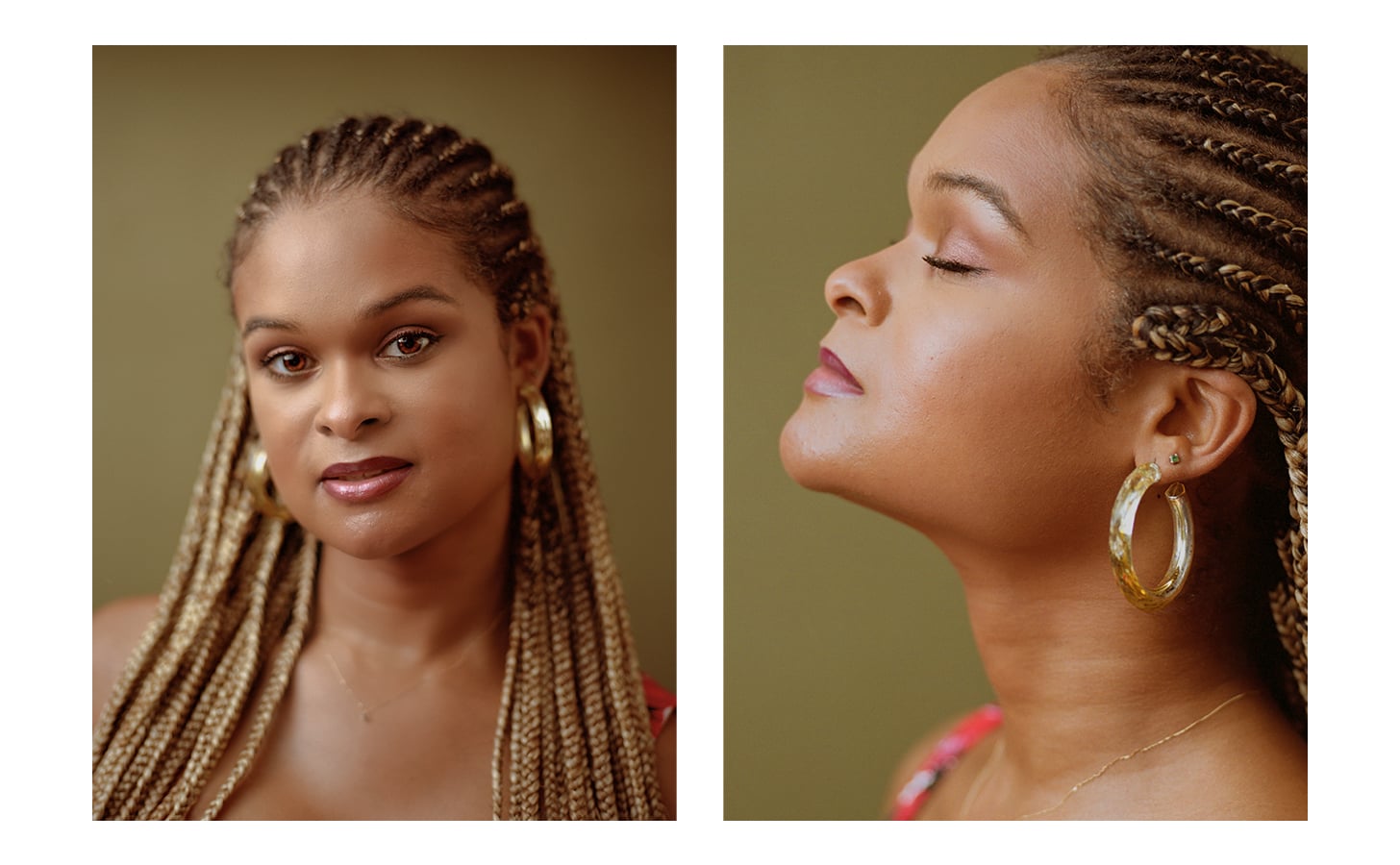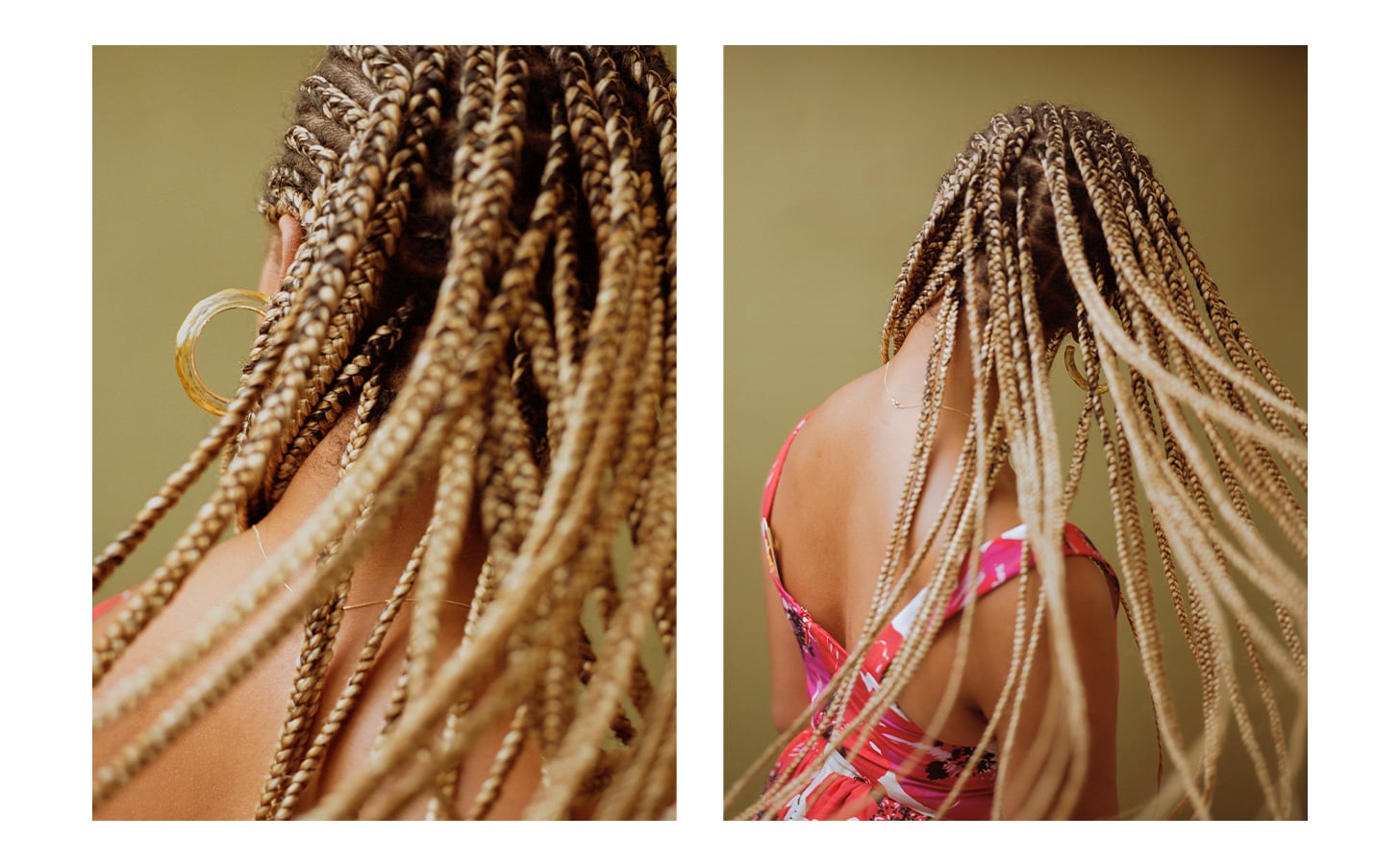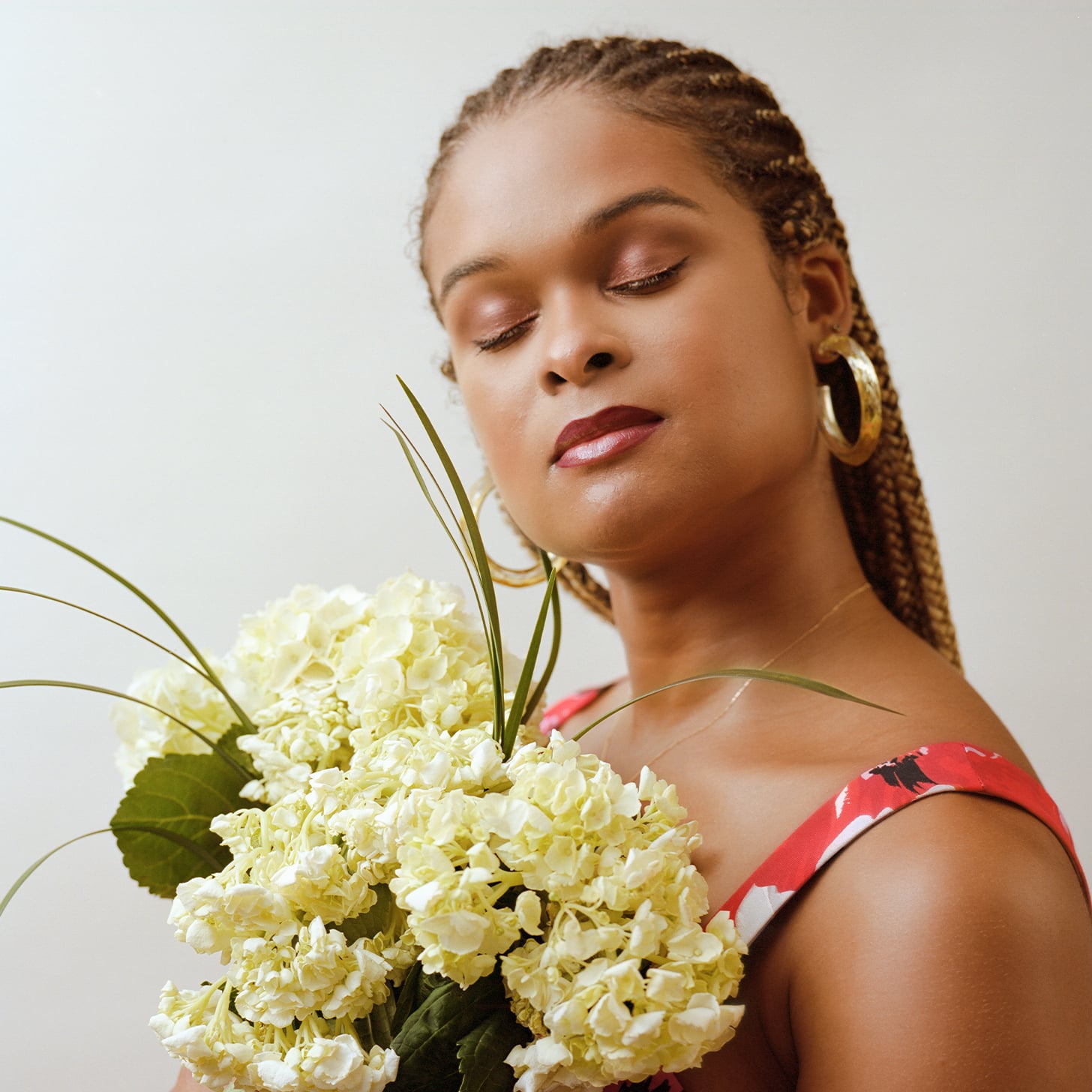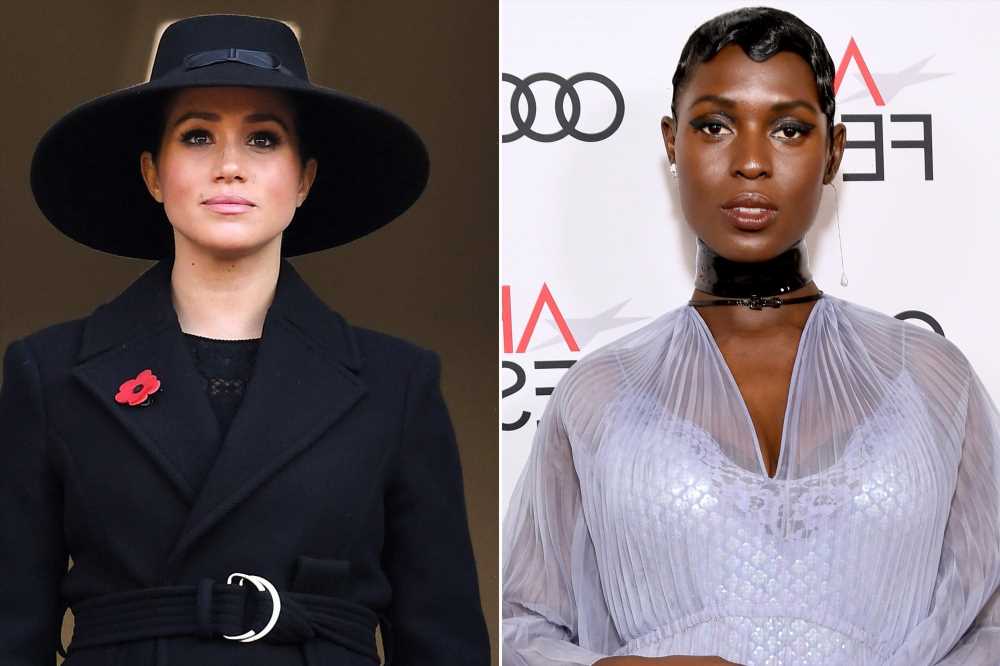“Black queer and trans folks are making history every day. Give us our flowers.” — Raquel Willis, 2,360 retweets, 7,070 likes
She had a point then, and it stands, so I ask her agent what her favorite flowers are. By email, Giselle Byrd replies: “Her favorite flowers are peonies.” Peonies aren’t in season yet, but Willis certainly is, so we settle for tulips and hydrangeas. “Nobody’s ever asked that before!” Willis says, eyeing them as I tie the bundles together with twine. Now, they’re in her hands.
After a 45-minute interview, she sits (and stands, and twirls) for a photo shoot with M. Cooper in his home studio in Brooklyn. Luckily, we all live nearby. The mask mandate was lifted today, and the sun is finally shining again. A roll of film in, Willis, 30, looks over and deadpans: “Florals? For spring? Groundbreaking.”
Willis knows all about giving trans women of color their flowers — more than any modern journalist who comes to mind. It’s time she gets hers. Her Out100 Trans Obituaries Project set out to honor the lives of trans women of color lost to violence, who were being “[reduced] to tragic statistics, empty platitudes, and talking points,” in 2019. As Out magazine’s first Black trans executive editor, she did just that: drawing attention to the life of Layleen Cubilette-Polanco and the lives of 21 other trans women of color with the obituaries they deserved. “Dana was simultaneously ‘very private, sweet’ and a ‘people person.'” “Chanel was a ‘big baby’ who wouldn’t hurt a fly, according to her mother, Brenda Scurlock.” “Kiki dreamed of becoming a fashion icon and always wore a head-turning outfit.” “Lorissa was loved.” Like its editor, the obits were full of life and love, reverence and warmth. The project drove home the message that Willis herself would declare in a speech delivered to 15,000 protestors in Brooklyn last June in the wake of the death of George Floyd: that Black trans lives matter, Black trans lives have always mattered, and it’s on all of us to elevate Black trans power.
“We have been told to be silent for too long. We have been told that we are not enough,” Willis told the crowd on the steps of the Brooklyn Museum. “To parents, to family, to lovers, to johns, to organizations, to schools, to our government, to the world. And the truth is, is that we’re more than enough.” She continued, to thunderous waves of applause: “I believe in my power. I believe in your power. I believe in our power. I believe in Black trans power.” Sentence by sentence, again and again, the crowd repeated after her in unison. For those of us too far away to hear her voice clearly, the echoes of those ahead of us filled the air until we learned the words. It was a moment more monumental to Black trans rights in the US than we knew at the time. And, like Willis’s legacy of showing up and showing out for Black and queer liberation, the echoes reverberate on.
This Pride, we honor Willis and so many others who do the hard, healing, life-bringing work of activating others toward love and liberation. That includes Queer Love in Color author Jamal Jordan and three organizers behind New York City’s “no cops, no corporations, no politicians” Queer Liberation March: Chidi Adeyemi, 24; Jay W. Walker, 53; and Ann Northrop, 73. Together, they represent a coalition that empowers us all: political, principled, and in full color.
On the day of her POPSUGAR photo shoot, we sat down with Willis to talk about the year in social justice, the changing state of journalism, and why all of us should be invested in Black trans liberation.
POPSUGAR: In 2020, you told W Magazine: “The big fight here is, how do we get white people to see their liberation bound up in Black and non-Black folks? How do we get straight people to understand that their liberation is bound up in queer folks? How do we get cis people to understand their liberation is bound up in trans folks?”
For me, to see you at the Black Trans Lives Matter rally in Brooklyn last year, delivering your address to 15,000 people and uproarious applause, saying: “I believe in my power. I believe in your power. I believe in our power. I believe in Black trans power.” To hear it said back. That’s how. In a rare moment like that, in that radical love, our collective future together looked abundantly better. Freer. My question is, in the wake of that speech, what has the work of the past year looked like for you?
PS: We know that, as said by Marwan Kaabour: “All systems of oppression reinforce one another — none can be fought in isolation.” As the world finally turns its gaze to Palestine, Sheikh Jarrah, to settler-colonialism and apartheid in real time, it has been heartening to see a new outpouring of solidarity with Palestine here in Brooklyn and beyond. How would you begin to approach the folks who haven’t spoken up yet, as you have, who see this as a fight disconnected from their own?
“I think we’ve got to get out of this idea that for us to have a valid claim on a perspective of oppression, we have to be seen as the most oppressed.”
I’ve never been satisfied with this idea that because I’m a Black trans woman, I am the most oppressed. And I haven’t been satisfied with that because I know other Black trans women, and I know what it means in a context where I’m in spaces with other Black trans women who have not had the same access I’ve had in terms of coming from a middle-class family, having consistent employment, being able to have higher education and access to it — me not having had to do sex work, right? Or any of these other things to survive. That I have plenty of Black trans peers, leaders who have had to do it. Or have had those experiences. We’ve got to get out of this idea that for us to have a valid claim on a perspective of oppression, we have to be seen as the most oppressed.
PS: That brings up a great point that we talked about yesterday with Jamal Jordan, who wrote Queer Love in Color: exploring the complexity of Black queer experience when the cultural imagination around queerness in Western media is so overwhelmingly white, cis, and male. To have this space dedicated to exploring the spectrum of queer experiences, like you said, on a Black- and trans-specific level, is so rare. And I think that’s why so many people have taken to that book — because it has filled a gap that is so much bigger than any single book could ever fill.
RW: Absolutely. It’s interesting for me as someone who comes from a journalism background and believes that storytelling is an organizing principle — that stories are an organizing tool — because I think that we have to be more flexible in how we think about the terrain of media and storytelling. We have to constantly be expansive, because when we have one breakthrough, that doesn’t mean that we stop there. We have to continue, because now, the bar has moved. Now we have white cis gay stories because Ellen [DeGeneres] came out, for instance. But that’s not as far as we could go. We have to continue to move beyond that.
PS: It also brings to mind: we talk about quote-endquote “queer” LGBTQ+ organizations that are still headed, for the most part, by white cis gay men who functionally reflect the interests of heteropatriarchy within those queer spaces: excluding women, excluding trans folks. It feels like a microcosm of the larger issues we face in the outside world. So, having autonomous trans leadership in those spaces is hugely important.
RW: It is. I mean, I deal with this at the intersection of all of these movements that I claim. In the LGBTQ+ movement, of course — really I would say, in all of these movements, all of these movements are susceptible to systems of oppression.
PS: Right.
“Our movements aren’t pure, and I don’t think that they’ll ever be that. But that doesn’t mean that we don’t continue to do that work to make them better.”
RW: So, the LGBTQ+ movement and the women-slash-feminist movement are in bed, sometimes, with white supremacy when people aren’t being vigilant in those fights. When I think about the Black liberation movements, there is a way that patriarchy will continue to reign in those spaces. And a cis-hetero patriarchy, in particular. All of them are susceptible to capitalism and other axes of oppression. Our movements aren’t pure, and I don’t think that they’ll ever be that. But that doesn’t mean that we don’t continue to do that work to make them better.
PS: A great segue, because I want to talk about the “media reckoning” of lore that a lot of us editors have anticipated over the past year. Having been an executive editor of Out, a liberatory force for good in media in your own right — having had so many fantastic projects, but the Trans Obituaries Project always comes to mind — how has our US media landscape changed in the past year, and what work do you think is left to be done?
RW: I think in general, the media is being scrutinized and critiqued, like most long-standing institutions in our society right now: it’s really just a reflection of that. More and more people are understanding that they need avenues to kind of directly create and be able to sustain themselves with that work outside of the context of the long-standing institutions. I think that unfortunately, a lot of what’s considered niche media, or identity-based media . . .
PS: Like, queer media?
“Queer media, Black media — they’re in a vulnerable position because of the very reason many of them were created.”
RW: Queer media, Black media — they’re in a vulnerable position because of the very reason many of them were created. There wasn’t any space for the communities they’re supposed to represent in these larger publications. And now, a lot of these publications are understanding that it’s become in some ways profitable — and expected — that they diversify their staffs and their content.
PS: Yesterday, the New York Times editorial board condemned corporate Pride in New York City for its plan to temporarily exclude the New York Police Department and its Gay Officers Action League (GOAL) from its Pride Parade. No doubt, the work of you, Eliel Cruz, Anti-Violence Project, Reclaim Pride Coalition, and countless other organizers and activists in New York City are to thank for this albeit tiny concession. How can we sustain momentum in this political moment where people are finally talking about the corporate presence and police presence at Pride?
“Our values have to be clear in terms of abolition and lessening the harm of policing, and the fight continues.”
RW: I think we have to consistently apply pressure internally as well as externally. Our values have to be clear in terms of abolition and lessening the harm of policing, and the fight continues. What’s beautiful about Reclaim Pride is that there has been a consistent effort to present a different opportunity to acknowledge our LGBTQ+ history. And you start small, and you have your contingent, but that signal can have ripple effects. And I think that that’s what we’re seeing with Heritage of Pride and NYC Pride.
When it comes to The New York Times, I mean, I think that we have to consistently interrogate who has the power to be heard. I don’t put my stock in people who are not in the community necessarily, and who are not in conversation with the folks most impacted by police brutality. I think that it’s disgusting for a contingent of powerful editors at the most powerful publication in the world to come together and chastise an already marginalized community that it is still trying to catch up with in terms of coverage — to make up for the past erasure — and demean a major step forward.
PS: One-hundred percent.
RW: And I mean, the thing about that op-ed is that not only is it chastising LGBTQ+ people, but it’s chastising so many leaders, and folks, and communities of color who have particularly in the past year, but beyond, shown the light on police brutality in a way that they have never been equipped to do.
PS: Exactly that. It has never been clearer that “certain longstanding values” of an editorial board like that, of a prestige paper like that, are unaligned with abolition and actual liberation for Black folks or queer folks. Have been unaligned.
RW: Yeah! They — like any other institution, especially being a long-running institution that has existed through various stages of American history — have not always gotten it right. We have to consistently remember that, even in this moment, that these institutions can and often do get it wrong.
“These ideas of fairness and objectivity sound great, but they are complicated by the invisible values of white supremacy, and patriarchy, and capitalism, and so much more.”
RW: You know, my issue as a Black trans journalist who’s come out of a traditional journalism training is that I was not fully considered or seen in that traditional lane. And so, I don’t have an allegiance, necessarily, to the invisible values that are tied to the institution of journalism in the US. These ideas of fairness and objectivity sound great, but they are complicated by the invisible values of white supremacy, and patriarchy, and capitalism, and so much more.
PS: And we know how it works! How across the years, the voices of Black journalists, and women journalists, of queer people, and so on, have been devalued and edged out in favor of narrators considered more “reliable” or “fair.”
RW: I’ll say, I’m not entirely sure who all is on the editorial board this year: I imagine it hasn’t changed that much from whoever was on the board during the 2020 presidential election. And I know even that contingent was not a majority queer!
PS: Absolutely not.
RW: And definitely no trans people.
PS: Not one that I know of.
PS: How would you envision a brighter future for Black women in America — Black trans women specifically?
“This is why I think everyone should be invested in Black trans liberation: because when we free Black trans folks up around gender, we free the world up as well.”
And that is not even just a trans thing. This is why I think everyone should be invested in Black trans liberation: because when we free Black trans folks up around gender, we free the world up as well. We have to consider what it means to radically move resources to keep people safe and alive and thriving. We have more than enough resources to take care of people in terms of healthcare, in terms of education, in terms of food insecurity and so much more, and I think when this country and leaders around the world start to consider that in a deeper way and actually move on it, then we’ll see a brighter future. I believe that abolition is an avenue for Black trans liberation, because we’re overwhelmingly caught up in the system on multiple axes of identity.
So, yeah, I think that that’s what the future is. Sometimes I ask myself the question of, who would I be if I didn’t have to fight so damn hard?
PS: I think about that question all the time.
RW: And I’m not entirely sure. Maybe I would be an artist somewhere, just trying to deepen how I express myself, versus having to put out fires that someone else started a long time ago.
PS: It reminds me of our interview with Hari Ziyad in April. Asking, what if Black kids were given the grace to grow as freely as white kids? What if we gave girls the grace to grow as freely as boys do?
RW: Well? The interesting thing is that, I don’t know if that’s freedom. Because I wouldn’t want to have been raised like white people were raised.
PS: Of course. Or, if I could rephrase: the freedom to individuate naturally, without roles imposed.
RW: Yeah! But I think that there’s something there that we don’t chew on enough. As a Black person, I don’t want to have the experience of a white person, and I don’t actually think that that’s freedom. The same thing as a woman: I don’t think that having had the experience of a cis man, or a cis straight man, would be freeing! Because we’re all shackled in some way by these systems of oppression. I mean, while the more marginalized person in a particular axis of oppression may have had it worse off, or been fed this delusion of their inferiority, I don’t think that it’s freeing to be fed a delusion of superiority, you know? Because that is another ideal that that person will constantly have to try to look up to.
“We all have to be willing and able to transform, so that we can see the liberation that we need.”
RW: It’s another lie! So, I think the truth is, we all have to be willing and able to transform, so that we can see the liberation that we need.
Source: Read Full Article





